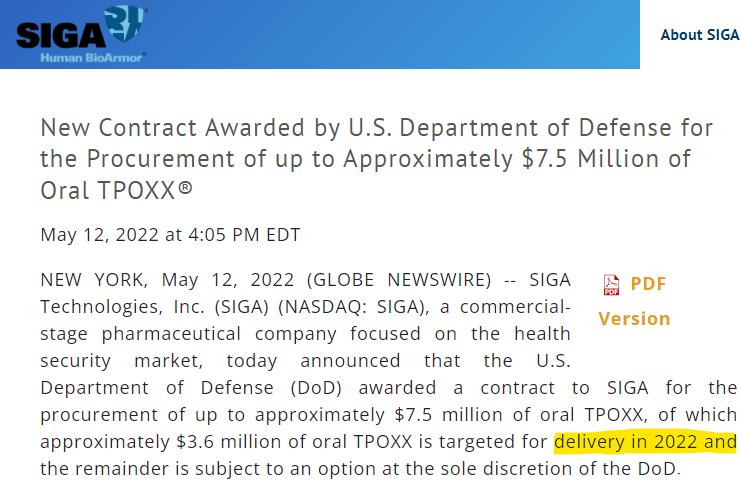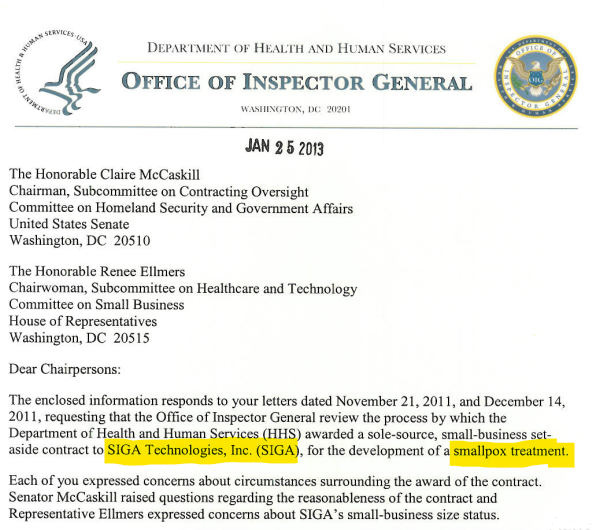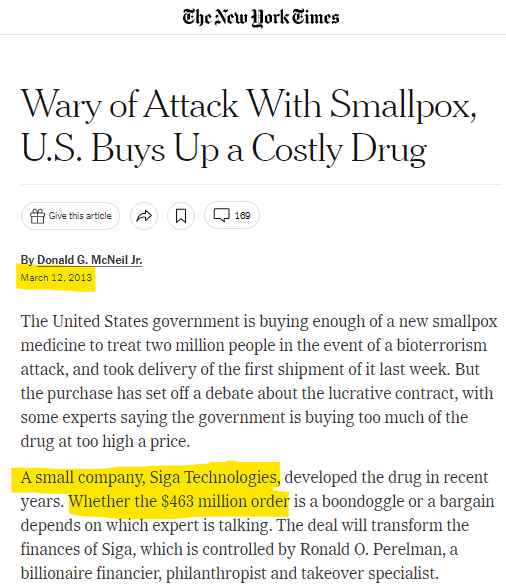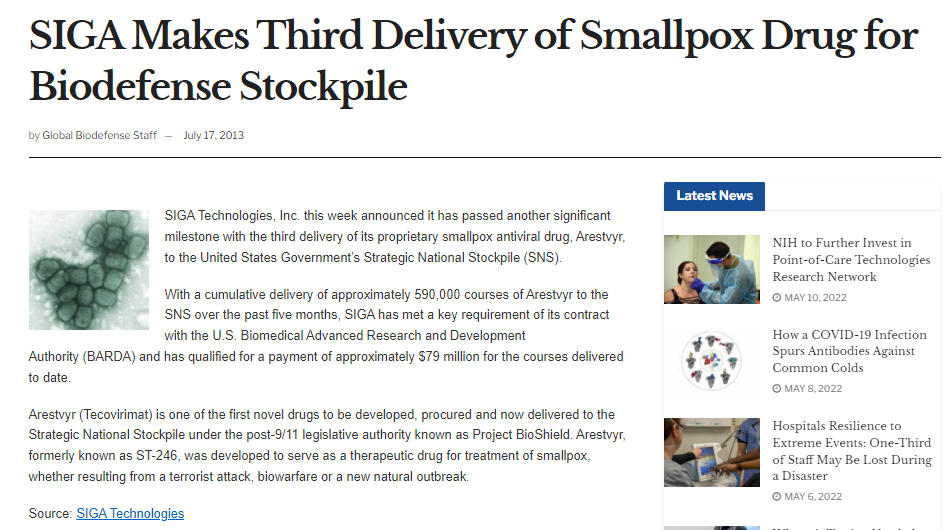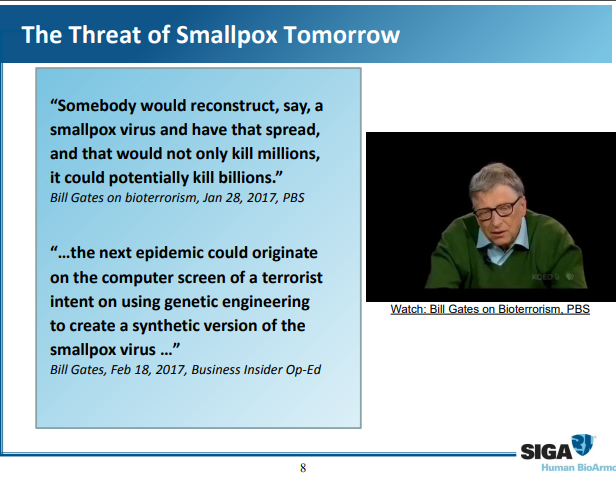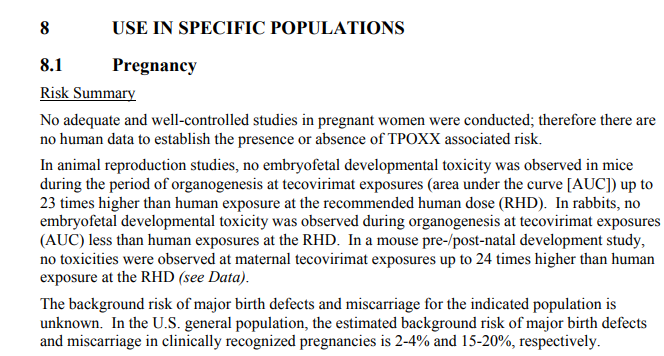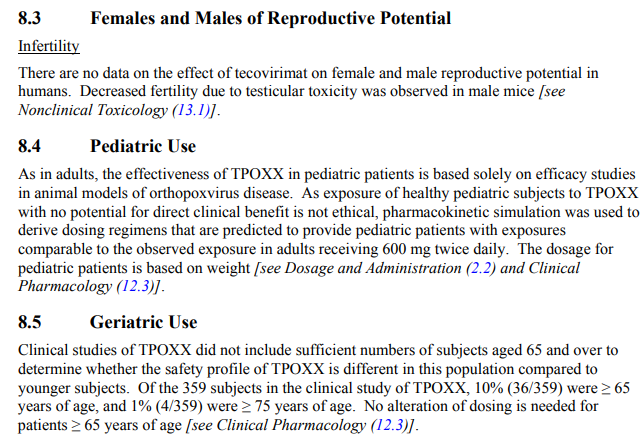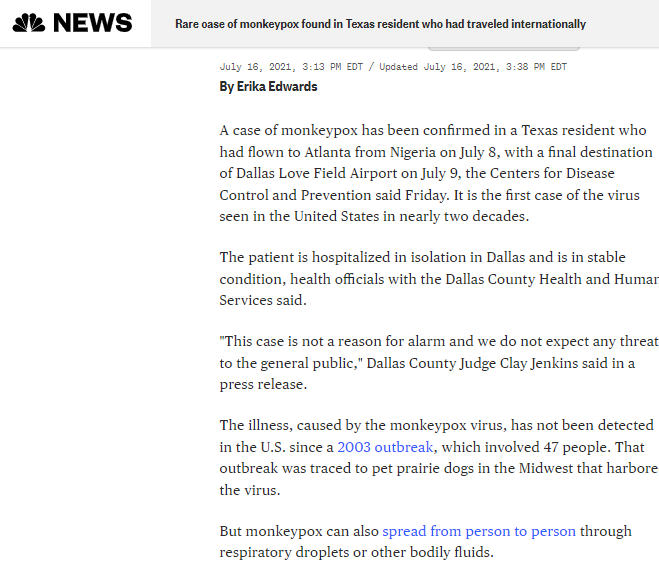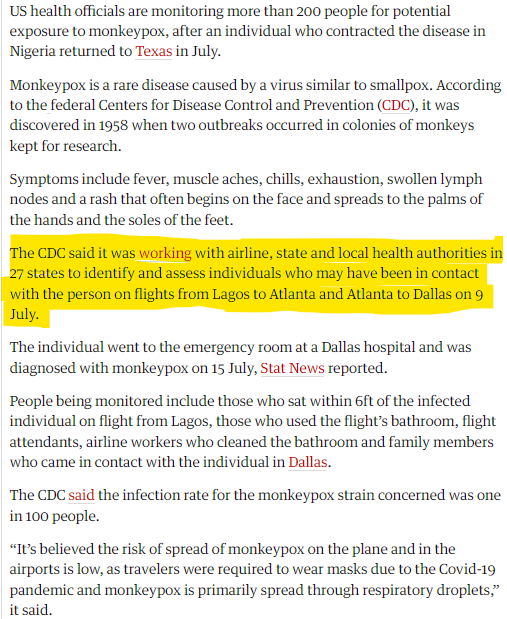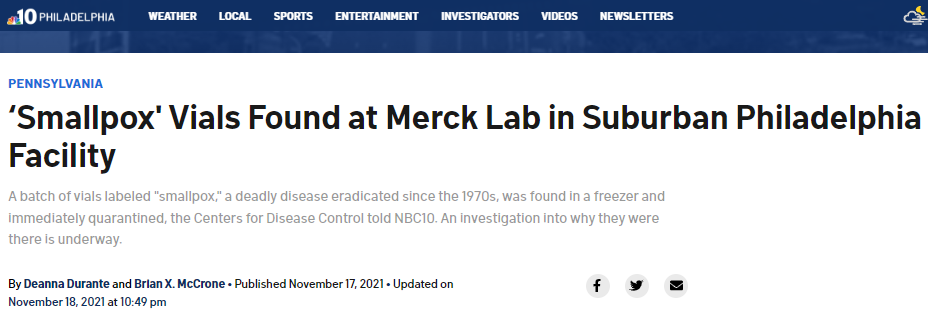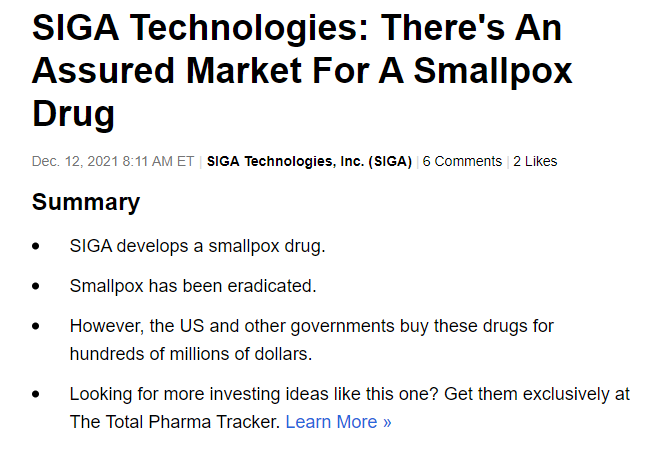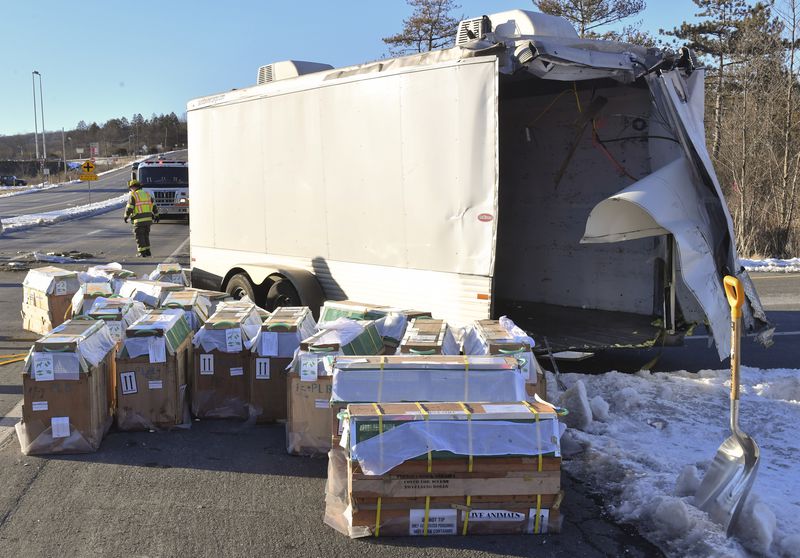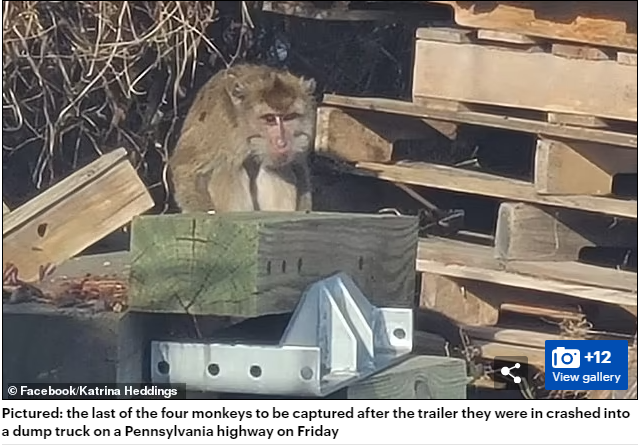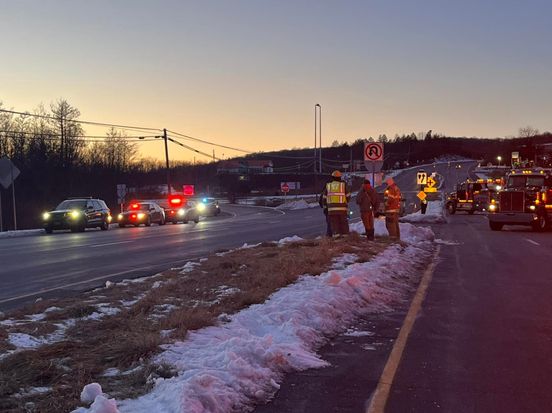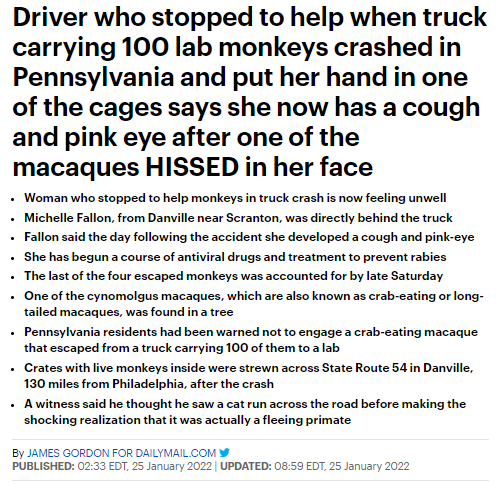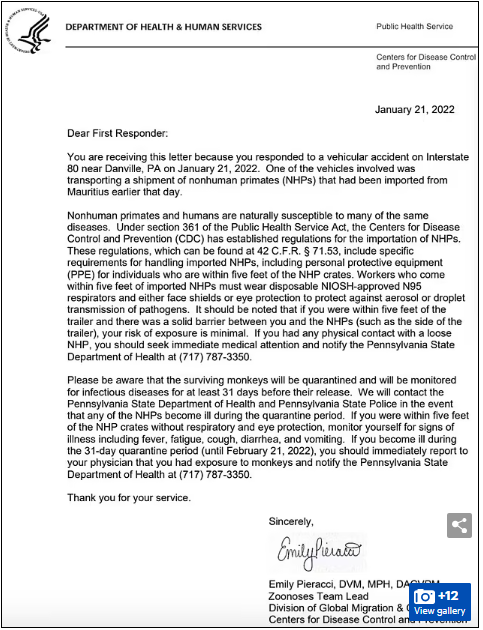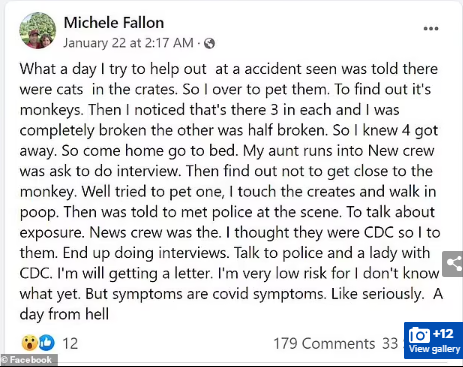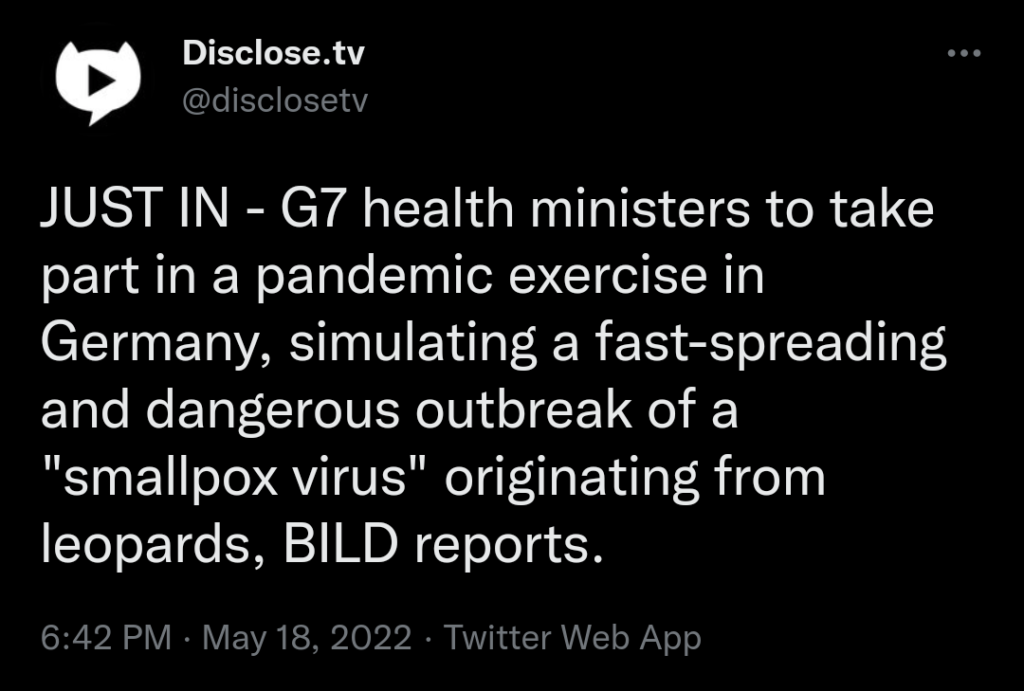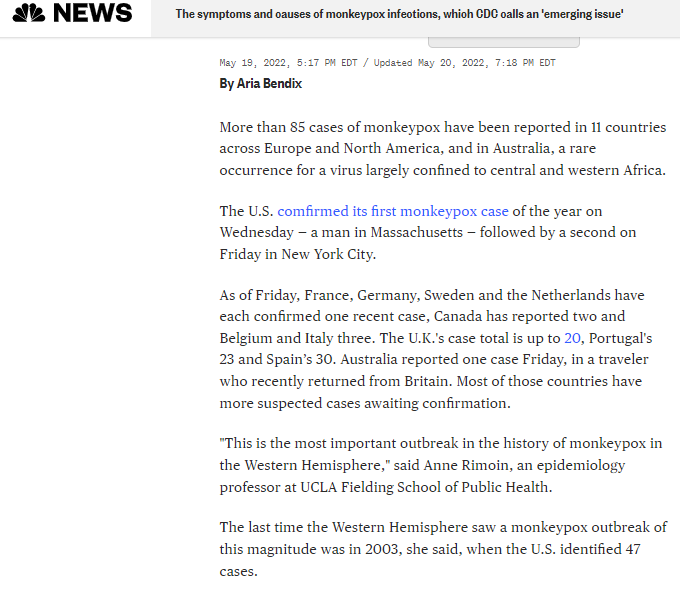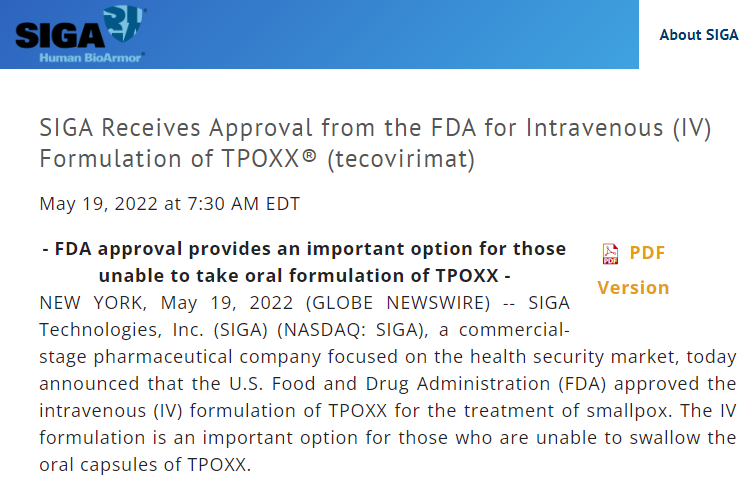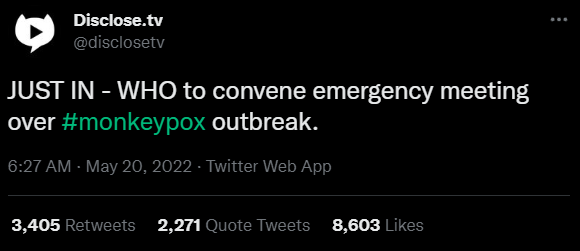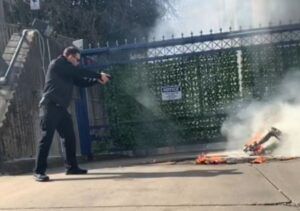Operation Dark Winter: The Predecessor to Event 201 Addressed a Hypothetical Smallpox Pandemic Caused by an Act of Terrorism. SIGA Has Been Awarded Lucrative Smallpox Drug Contracts by the US Government for over a Decade.
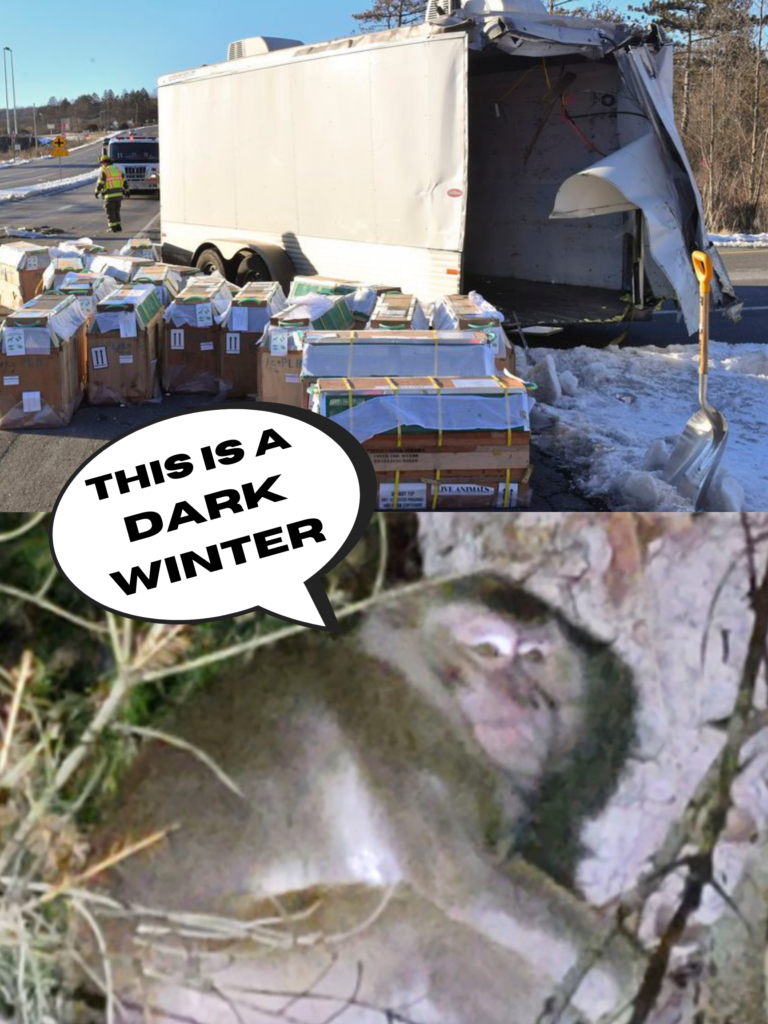
In 2001, Johns Hopkins University held a tabletop exercise where participants responded to a smallpox pandemic caused by an act of terrorism. Like 2019’s 201 Event, Operation Dark Winter sought to prepare for a future pandemic, outlining how the government and private actors could combat problems such as vaccine shortages, high fatality rates, and civil unrest.
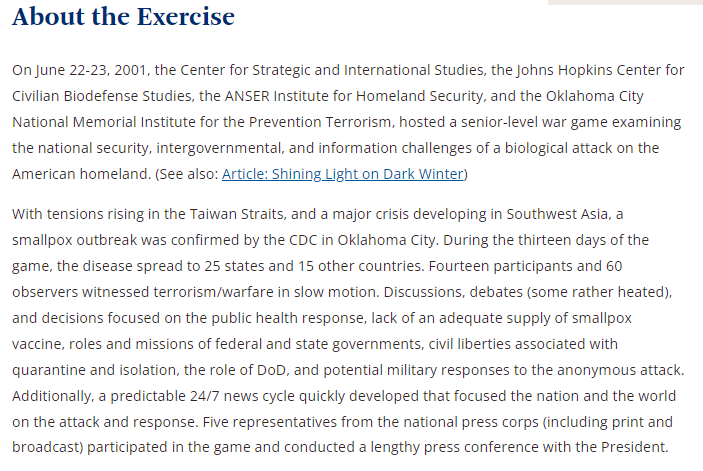
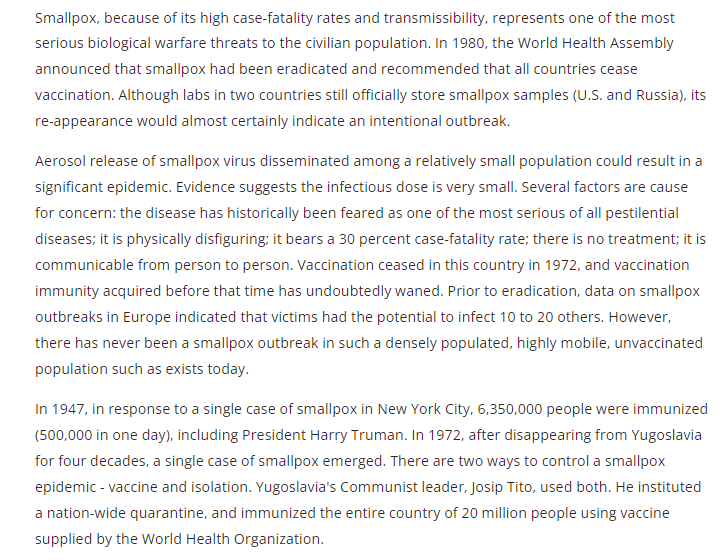

Shining Light on “Dark Winter” summarizes the “tabletop exercise:”
SIGA Contracts Called into Question by LA Times (Nov. 13, 2011)
A major Democratic party donor, Ronald Perelman, was the controlling shareholder of SIGA in 2011 when LA Times highlighted potential corruption regarding contracts awarded to SIGA for smallpox medications:
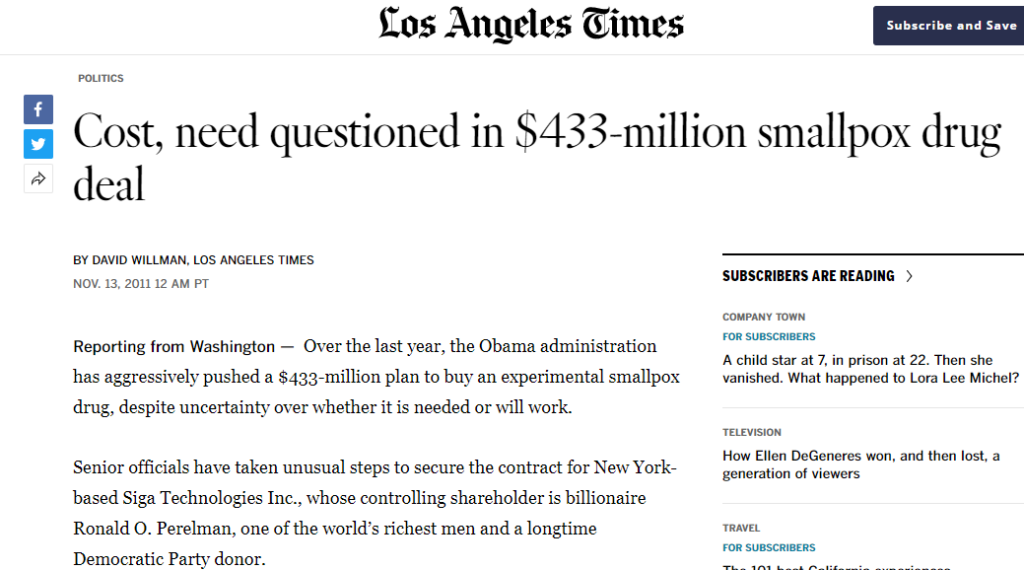
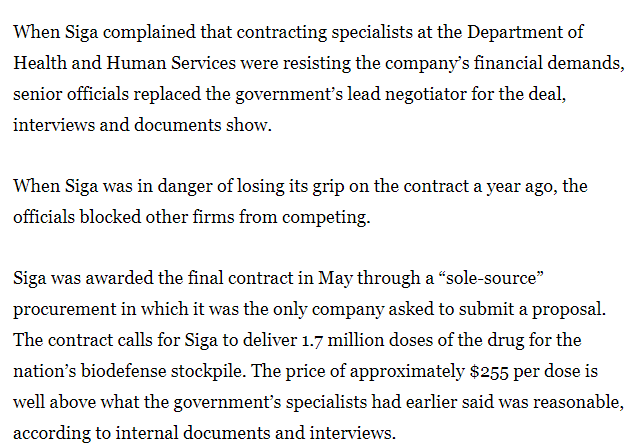
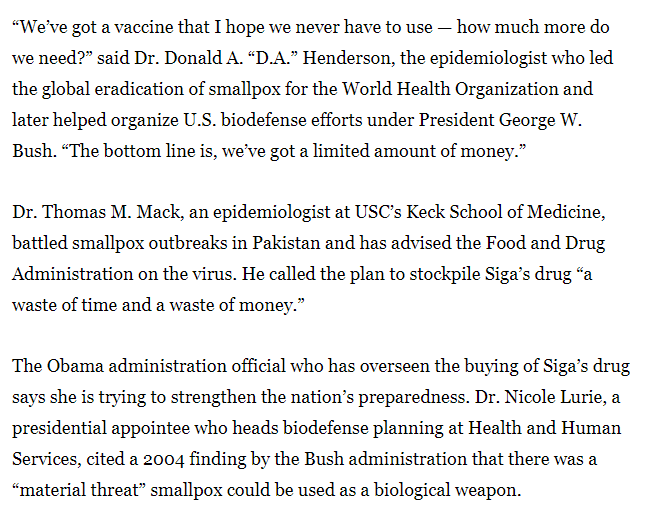
SIGA’s maintained strong political connections to the Obama administration and landed lucrative contracts worth up to several billion dollars. The administration also blocked other companies from competing against SIGA.
“Worrying about worst-case scenarios is what biodefense planners do. In the case of smallpox, millions of Americans have no immunity because the vaccination of civilians ended in 1972. And there is no way to guarantee that a rogue regime such as North Korea is not holding smallpox.
Nonetheless, no such threat has been verified. The Bush administration suspected Saddam Hussein of possessing smallpox and other biological weapons, but inspectors did not find any after the U.S. invaded Iraq in 2003.
Still, pressure to move quickly and spend more has helped shape U.S. biodefense policy since the Sept. 11, 2001, terrorist attacks and the anthrax mailings that fall.
Investors such as Perelman saw opportunity. In 2003, Perelman, through his holding company MacAndrews & Forbes Holdings Inc., invested heavily in Siga and installed a team of executives to run it.
The move seemed prescient when Bush, in June 2004, signed Project BioShield, a 10-year, $5.6-billion initiative to fund the development and stockpiling of medications to counter bioterrorism.
Two months later, Siga purchased the rights to what became known as ST-246 and other assets from a Pennsylvania company, ViroPharma Inc., for $1 million in cash and 1 million shares of Siga’s common stock. Over the next three years, the National Institute of Allergy and Infectious Diseases awarded Siga two research grants and a related contract, worth a total of $23.5 million, to develop the new drug.
From the outset, there was only one potential customer: the U.S. government.
For Siga, the stakes were high. ST-246 was its most promising experimental compound.
From 2005 through September, the company has paid three lobbying firms $800,000 to represent its interests in Washington, public records show. Disclosures filed by the lobbyists said they focused on Project BioShield and “issues related to homeland security and HHS,” along with “government procurement of vaccines.”
Siga representatives told The Times that the company had lobbied only “generally” for biodefense spending, adding: “Neither Siga nor anyone else on Siga’s behalf ever lobbied anyone to get this contract.”
Perelman and others at Siga’s affiliate, MacAndrews & Forbes, have long been major political donors. They gave a total of $607,550 to federal campaigns for the 2008 and 2010 elections, according to records compiled by the Center for Responsive Politics. About 65% of that money went to Democrats. Perelman donated an additional $50,000 to President Obama’s inauguration.
A spokeswoman for Perelman said his contributions reflected nothing more than “his right as a citizen to support candidates he believes in.”
From December 2007 to January of this year, Rose, Siga’s chief executive, served on the U.S. National Biodefense Science Board, which has advised Lurie on how to respond to biological terrorism and other potential health emergencies. (Rose was appointed during the Bush administration.)
In June 2010, Siga further heightened its presence in Washington by naming to its board Andrew Stern, former head of the Service Employees International Union and a frequent visitor to the Obama White House. The union is a wellspring of campaign money and volunteers for Democratic candidates.
On Oct. 13, 2010, Siga announced that the government intended to award it a contract for ST-246 worth as much as $2.8 billion. Within days, Siga’s stock price soared. In its year-end financial statement, the company said:
“Our ability to generate near-term revenue is particularly dependent on the success of our smallpox antiviral drug candidate.”
But the federal contract required that the winning bidder be a small business, with no more than 500 employees. Chimerix Inc., a North Carolina company that had competed for the contract, protested, saying Siga was too big.
Officials at the Small Business Administration investigated and quickly agreed, finding that Siga’s affiliation with MacAndrews & Forbes disqualified it.
The Obama administration could have awarded the contract to Chimerix as the only eligible small-business applicant. Or it could have reopened the competition to companies of any size.
Instead, the administration moved to block all companies — except Siga — from bidding on a second offering of the contract.
In early December, officials completed a required “justification for other than full and open competition,” which said an antiviral against smallpox was needed within five years and Siga was the only company able to meet that timetable.
The rationale was questioned by some in HHS, including contracting officer Brian K. Goodger, who in an internal email called it “a stretch.”
On Feb. 18, HHS terminated the original contract and requested a proposal from Siga.
Siga and government officials soon began tangling over the price the company would be paid. Because the contract was no longer to be awarded based on competition and because the only customer was the government, officials sought to assess whether the company’s proposed price was “fair and reasonable,” as required by federal law.
In so doing, officials looked at how much government money had already gone into developing ST-246. Public records show $115 million in federal support, not including the stockpile contract.
After reviewing Siga’s costs and the prices of other drugs produced in low volumes compared with commercial products, the HHS negotiators wanted to pay about $170 for each treatment. The company argued for more based on ST-246’s potential value to the nation.”
HHS OIG Requests Information About SIGA Contracts (January 25, 2013)
SIGA Awarded $463 Contract for Smallpox Drug (March 2013)
SIGA Completes Third Delivery of Smallpox Drug (July 2013)
SIGA Cites Bill Gates Warning of Smallpox Pandemic During Investor Presentation (2017)
During a 2017 investor presentation, SIGA included a slide of Bill Gates warning about the threat of a smallpox pandemic, which could result from a cyber or bioterrorism attack:
The presentation focused on developing oral and IV smallpox treatments and obtaining FDA approval:
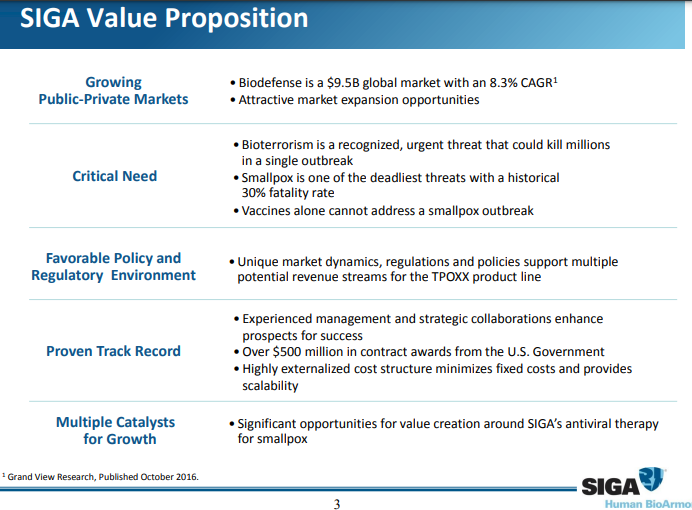
The full presentation is in the PDF below:
SIGA Smallpox and Monkeypox Drug Approval (2018)
SIGA is a “commercial-stage pharmaceutical company focused on providing solutions for unmet needs in the health security market that comprises medical countermeasures against chemical, biological, radiological, and nuclear (CBRN) threats, as well as emerging infectious diseases.” The company received more than $1 billion in government contracts.
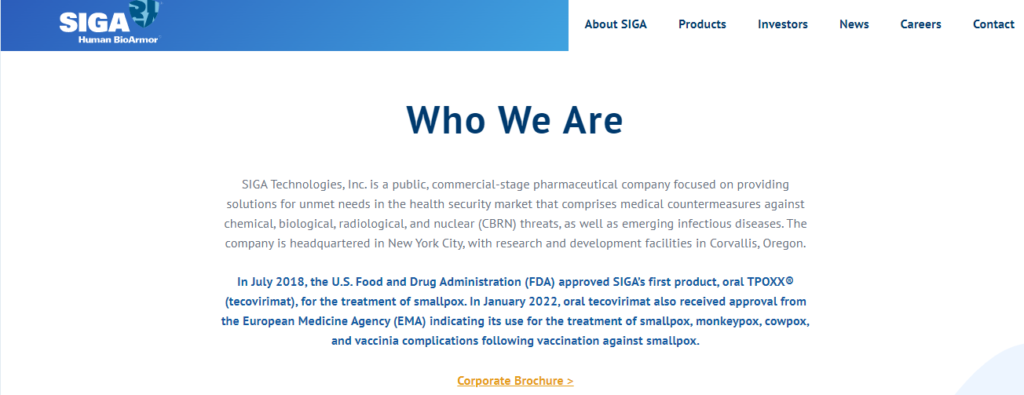
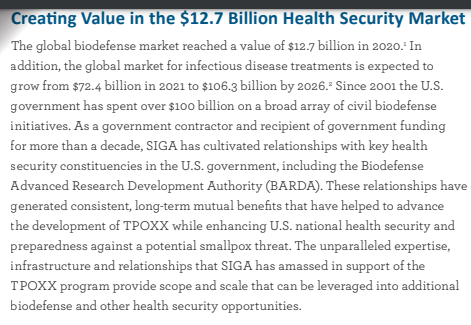
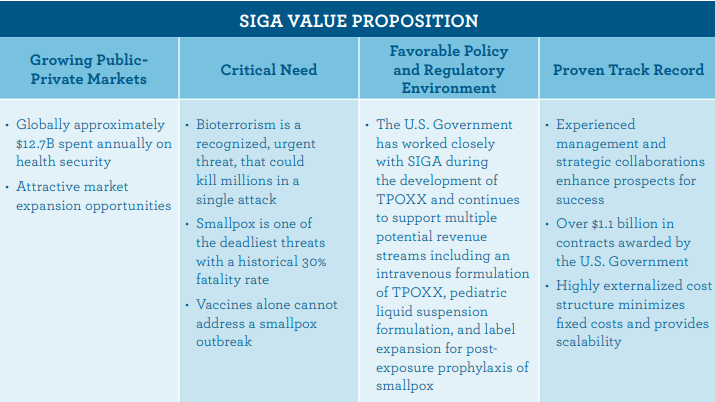
“SIGA’s most recent contract with the Biomedical Advanced Research and Development Authority (BARDA), primarily for the maintenance of a strategic stockpile of smallpox antiviral therapy, was awarded in September 2018 and has a value in excess of $600 million (if all options are exercised). To date approximately $240 million of TPOXX® has been delivered under this contract. In 2011, SIGA was awarded a contract with BARDA which led to the delivery of $460 million of oral TPOXX® to the strategic stockpile.”
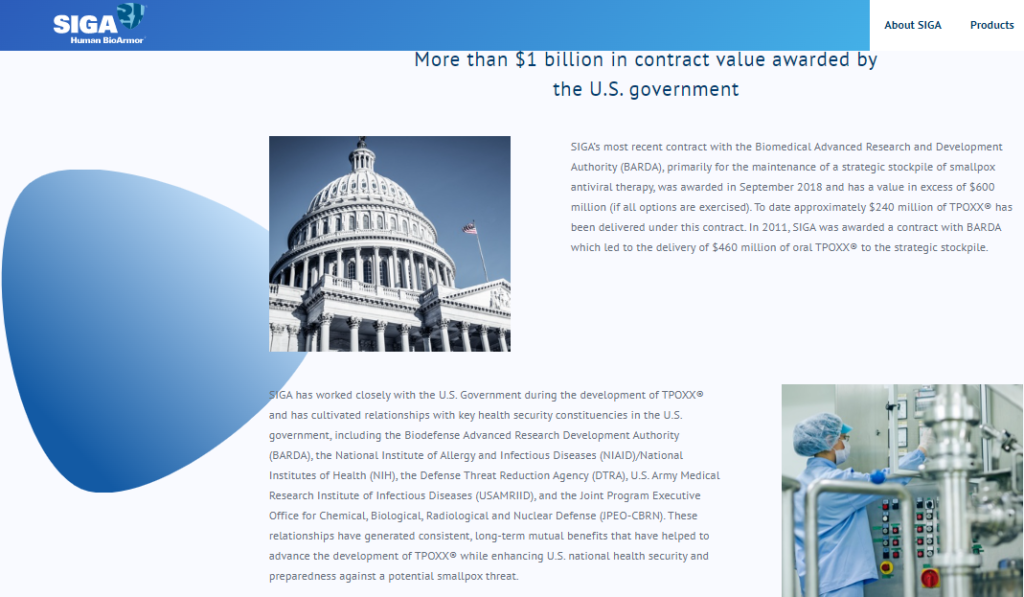
SIGA has partnered with the US Department of Defense, the CDC, and the NIH:
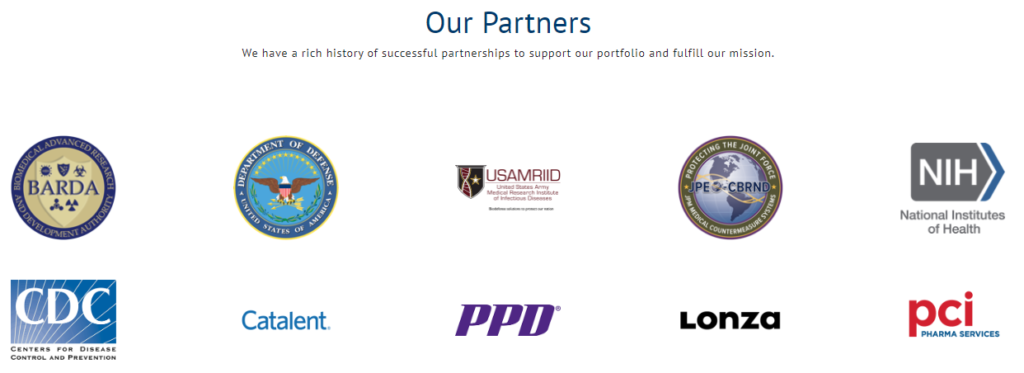
The FDA approved SIGA smallpox treatment TPOXX despite limited an inability to test the drugs efficacy in humans:
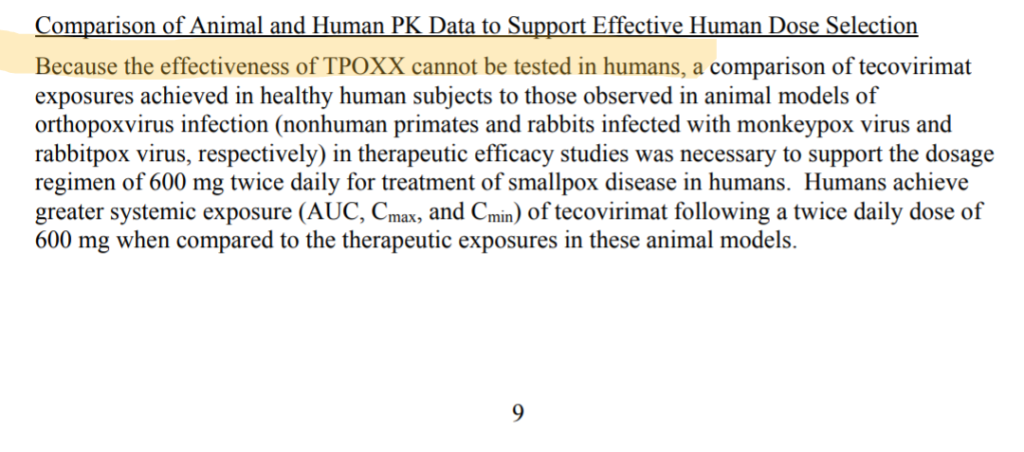
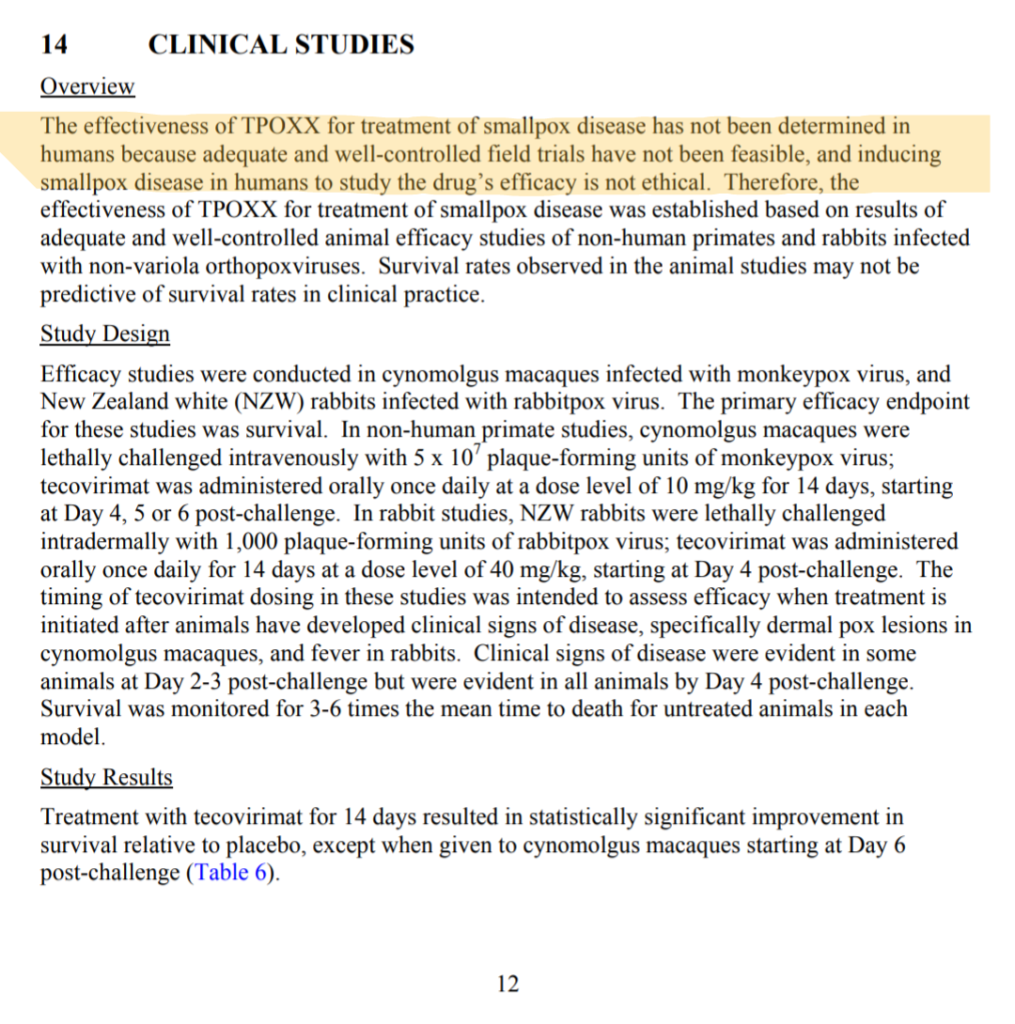
TPOXX had no data about regarding pregnant women:
There was also no data for TPOXX’s impact on fertility or the drugs safety among children:
NTI Hosts “Tabletop Excercise” Involving Monkeypox Pandemic (March 2021)
NTI and the Munich Security Conference partnered in March 2021 to “conduct a tabletop exercise on reducing high-consequence biological threats….the fictional exercise scenario portrayed a deadly, global pandemic involving an unusual strain of monkeypox virus that first emerged in the fictional nation of Brinia and spread globally over 18 months:”
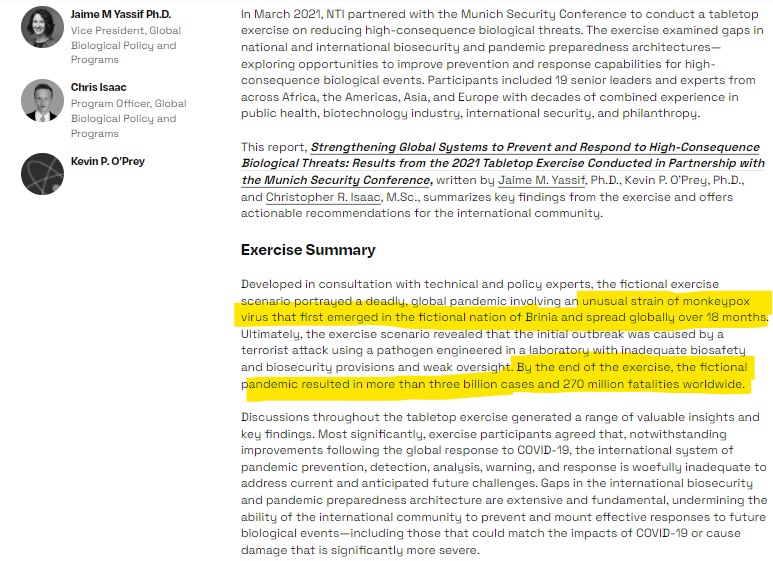
The report concluded nations should take a “no regrets” approach to address future pandemics:
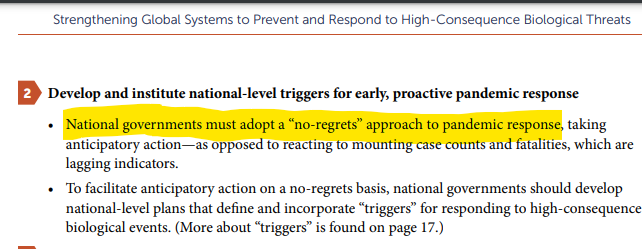
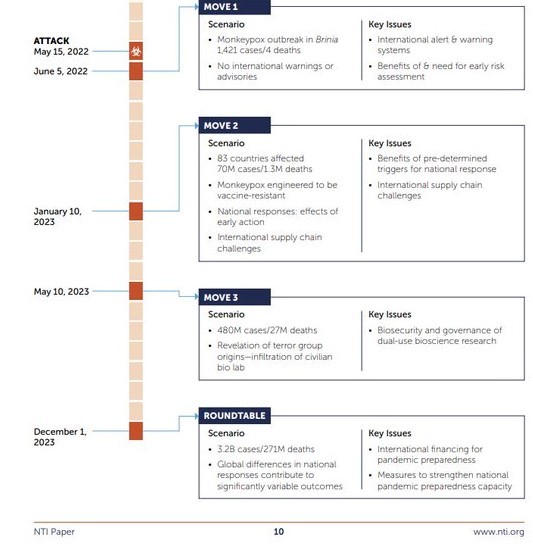
The report for the tabletop exercise in its entirety is in the PDF below:
Rare Case of Monkeypox in Texas Involving Internation Airline Passenger (July 2021)
A case of monkeypox was reported in Texas in June 2021:
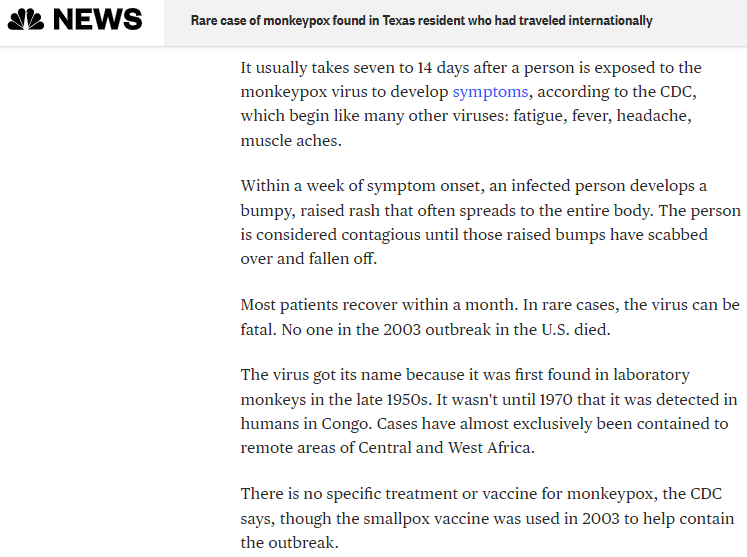
And on June 16, 2021, the Texas DSHS released a statement about the monkeypox case investigation involving an international traveler:
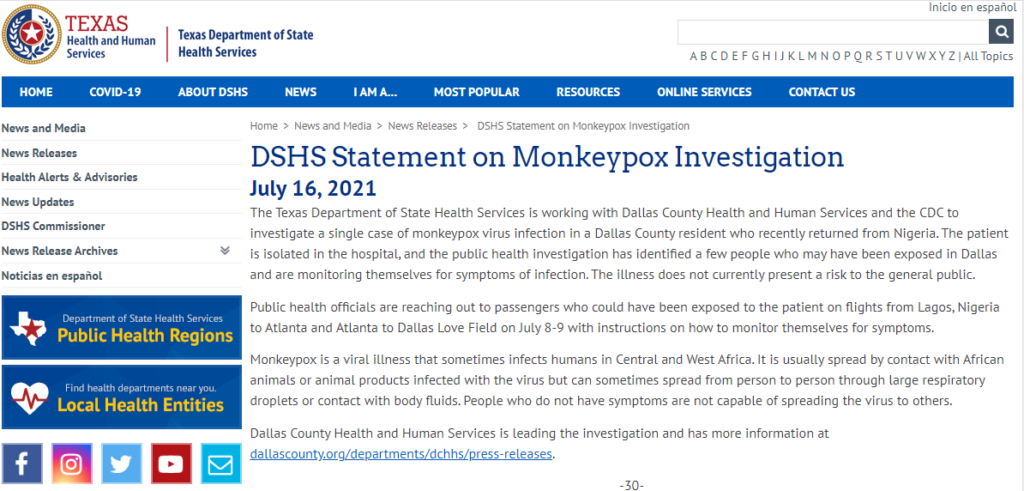
The monkeypox case resulted in the CDC working with agencies in 27 states to monitor 200 people connected to the airport monkeypox exposure for symptoms:
Bill Gates Warns About Smallpox Terrorist Attack at Airports (November 4, 2021)
In November 2021, Bill Gates ominously warned about a potential smallpox terrorism attack. Yahoo wrote on November 4, 2021:
“Bill Gates has warned that governments must prepare for future pandemics and smallpox terror attacks by investing billions in research and development.
Mr. Gates made the warning during a Policy Exchange interview with the chair of the Health Select Committee Jeremy Hunt. The Microsoft founder also called for the formation of a new billion-dollar World Health Organisation Pandemic Task Force.
While the research may be expensive, he said that it could also lead to other innovations, such as eradicating flu and the common cold.”
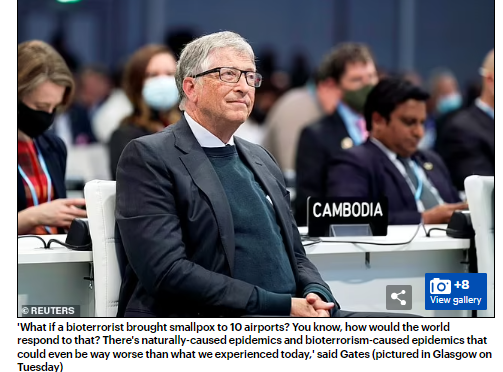
Monkeypox Case Confirmed in Maryland (Nov. 16, 2021)
On November 16, 2021, the Maryland Department of Health released a statement confirming a case of monkeypox from a resident who recently traveled internationally:
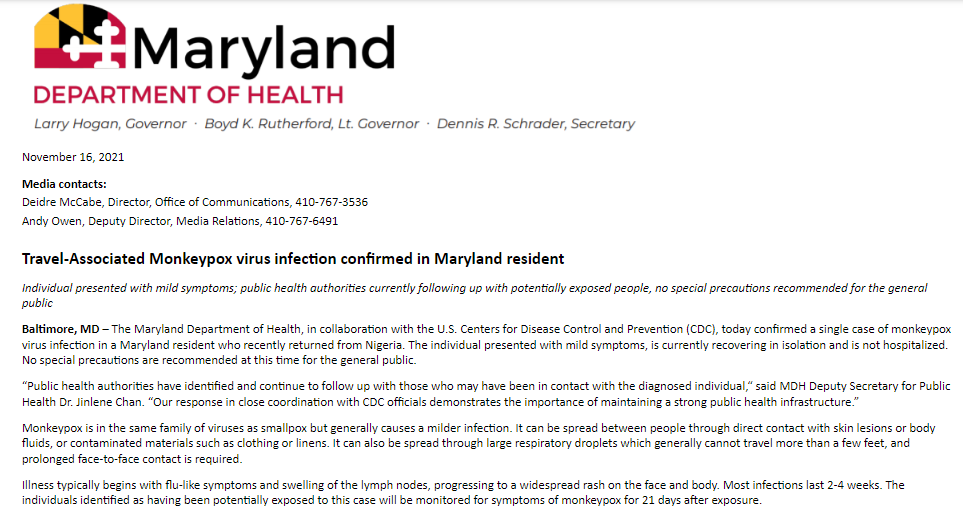
Vial with Smallpox Vaccine Virus Found in Pennsylvania Lab (Nov. 18, 2021)
On November 18th, 2021, vials labeled smallpox, which contained “the virus used in the vaccine for the virus and not the virus that causes the disease,” were found at a Merk lab in Pennsylvania:
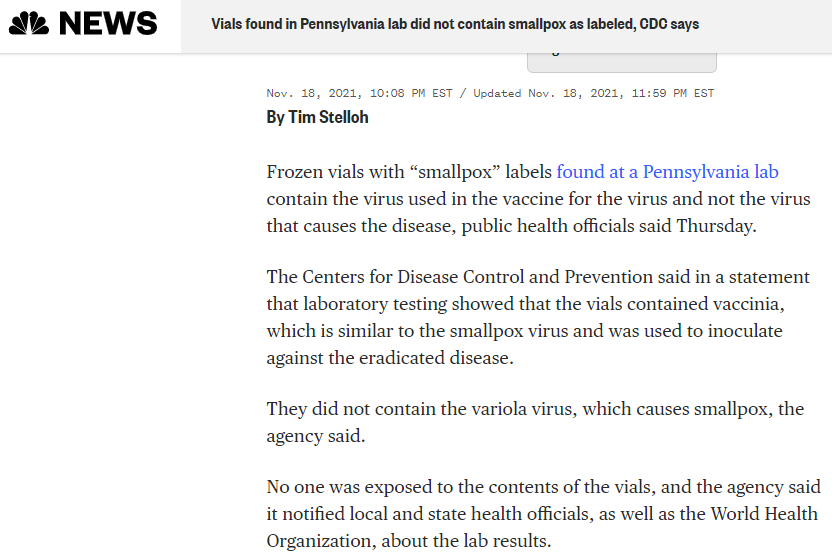
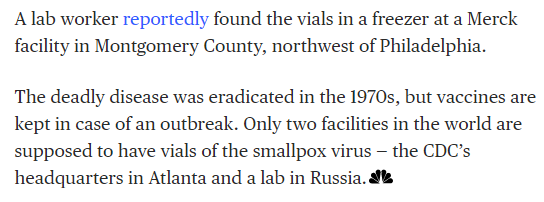
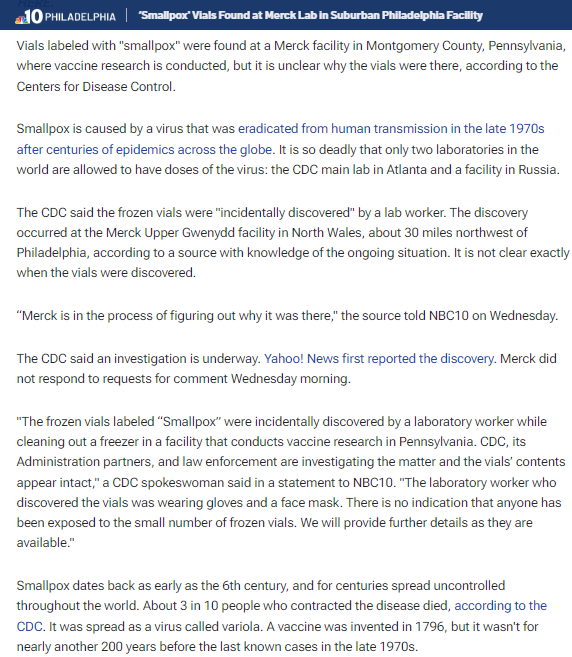
Seeking Alpha: SIGA Claims There is An Assured Market for Smallpox Drug (December 21, 2021)
Seeking Alpha included a graphic citing a 2017 quote by Bill Gates about a potential smallpox pandemic:
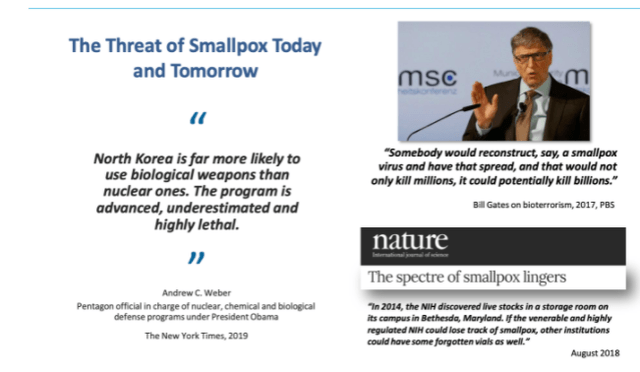
Escaped Lab Monkeys in Pennsylvania (January 2022)
On January 21, 2022, a truck hauling 100 lab monkeys crashed in Danville, Pennsylvania along Interstate 80. The accident resulted in several lab monkeys escaping. The escaped monkeys were captured and euthanized.
Close Contact of Escaped Lab Monkeys Develops Symptoms (January 2022)
A witness to the accident came into close contact with the lab monkeys and developed symptoms by January 25th, 2022:
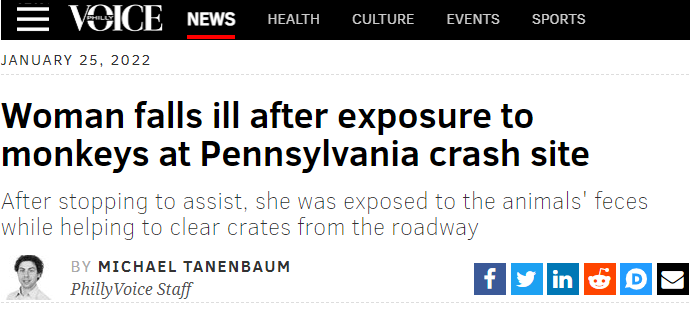
“A woman who offered assistance at the scene of a truck crash involving captive lab monkeys in rural Pennsylvania says she has fallen ill after being exposed to the animals’ feces and saliva.
The wild incident unfolded Friday afternoon in Danville, where a truck carrying 100 monkeys collided with a dump truck, spilling the animals onto Route 54 near I-80 in Montour County. Four monkeys escaped from their crates. One was corralled at the scene. The three others became the subjects of a lengthy search by Pennsylvania State Police and the Pennsylvania Game Commission, which located and euthanized the animals Saturday.
Danville resident Michele Fallon was driving directly behind the truck that crashed and observed the monkey crates tumble from the trailer. In a Facebook post, Fallon said she initially was told there were cats inside the crates and offered to help with the cleanup – only to discover she was surrounded by monkeys.
“I thought I was just doing the right thing by helping,” Fallon said in an interview Monday with WBRE. “I had no idea it would turn out this way.”
After touching and handling the monkey crates, Fallon said she later developed a cough, runny nose and a pink eye-like reaction in one of her eyes. She explained that she’d had a prior open cut on her hand and became worried about her health.
One of the long-tailed macaques “hissed” at her from inside a crate that fell onto the roadway, she said.
“I was close to the monkeys. I touched the crates. I walked through their feces. I was very close,” Fallon said. “I was inside the trailer where the monkey crates were, so I called to inquire, you know, was I safe?”
When Fallon initially got out of her car to help, she said she was not warned by the truck driver that she shouldn’t approach the crates or interact with the animals.
“If he would have told me that, then I would have been more careful,” Fallon said.
She was later interviewed at the scene by state police and workers from the U.S. Centers for Disease Control and Prevention. They urged her to take precautions since the monkeys had not been quarantined and monitored.
Fallon went to Geisinger Medical Center in Danville, where she received her first dose of a rabies vaccine and was prescribed anti-viral medication for two weeks.
The shipment of cynomolgus monkeys, commonly known as crab-eating or long-tailed macaques, arrived in the United States via John F. Kennedy International Airport from the island nation of Mauritius in the Indian Ocean. They were destined for an unnamed, CDC-approved quarantine facility.
The monkeys are considered highly valuable for experimental research, each worth as much as $10,000. Demand for them has increased during the coronavirus pandemic to aid in vaccine development, prompting some scientists to argue that the U.S. should keep a strategic reserve similar to the U.S. government’s grain and oil stockpiles.
During the search for the three escaped monkeys, state police had warned the public not to assist in looking for the animals or come into contact with them. The CDC provided technical assistance to state police in managing the response to the incident.
Fallon received a letter from the CDC, obtained by The Daily Mail, urging her to “seek immediate medical attention” if she had any contact with a loose monkey.
“Nonhuman primates and humans are naturally susceptible to many of the same diseases,” the CDC explained in its letter.
One of the diseases spread by long-tailed macaques is the herpes B virus, which can be transmitted through saliva, feces or urine. Infections, though extremely rare, can lead to the development of blisters and potentially life-threatening complications if left untreated, according to the CDC.
“Because the monkey did hiss at me, and because there was monkey feces around, and I do have an open cut, they just want to be precautious,” Fallon said of the treatment she’s received.
Others who may have been exposed or in close contact with the monkeys also are advised to seek medical attention.
The CDC wrote in its letter that the surviving monkeys will be quarantined and monitored for infectious diseases for at least 31 days before their release.”
SIGA Awarded Contract by DoD for Smallpox Medication (May 12, 2022)
